Sun 28 Jun 2009
Review: FERGUSON FINDLEY – Counterfeit Corpse.
Posted by Steve under Authors , Bibliographies, Lists & Checklists , Reviews[2] Comments
FERGUSON FINDLEY – Counterfeit Corpse.
Ace Double D-187, paperback original; 1st printing, 1956.
Findley wrote a small handful of crime novels back in the 1950s, and I’ll add a list of them at the end of my comments on this one, which I enjoyed, but which I’d be hard pressed to recommend to anyone else without waving a lot of warning flags first. (Read on.)
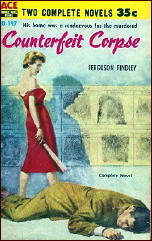
A fellow named Don Ivy is the featured player in Counterfeit Corpse, and he tells the story himself. After being bounced out of England, after years of knocking around Europe and northern Africa during and after the war, and now that his mother’s dead, he’s settled down in the small town in New England and living in the very same house he grew up in.
It’s not clear whether the town of Tombury is supposed to be in Vermont or New Hampshire, but since later on in the story he and his niece Judy have to cross the Massachusetts line while making a quick trip to Boston, my vote’s for the latter.
Which of course doesn’t matter to you. What does matter, I think, is that the reason he was quietly kicked out of England was his expertise in making counterfeit plates (for ten pound notes) so well that the bills they were capable of printing could not be distinguished from real ones, save for one small deliberate flaw that only Ivy knows.
He has no record in England, though — it’s been erased, thanks to services to the Crown. Which is all prelude to the story, though, which begins with Ivy finding a body in his yard while doing a spring cleanup. Then another – a roadside accident — then his niece Judy, whom he hasn’t seen in maybe 15 years, shows up; and then another body is found face down in a pond behind his house.
Coincidence? Not on your life. It certainly gets the local authorities into an uproar, though. First the local cop, then a state policeman, then a guy from the FBI. It’s up to Ivy and the surprisingly capable assistance of his niece Judy to get him out of trouble before he’s up to and over his neck in it.
Breezily told, in good old-fashioned pulp magazine style, the tale has some flaws I ought to tell you about, too. The pile up of bodies is no coincidence, but heading to Boston to look for clues, it strikes me as next to impossible that he find the correct cheap night spot where all of the players in the plot struck out from, in only one try — and how did they all come to be there in one spot to begin with? That’s neatly not mentioned or alluded to either.
There is not a lot of detective work going on in this book, not the real deductive kind, that is, until the end, in which (unless I’ve read it wrong) Ivy doesn’t recognize a certain telephone number, one that he should know, until several hours later, when it is almost too late.
What is amusing, I think, is how Ivy manages to steal the local cop’s girl friend away from him, after the local cop, trying to be friendly, uses the girl friend as part of his cover in the aforesaid enterprise.
And if you’ve read this far, you might as well read the book and see how he does it, whether it ‘s a good move or not; or on the other hand, you might decide that I’ve told you enough of the story already, and that anything more would be superfluous.
Bibliographic data: [Expanded from the Revised Crime Fiction IV, by Allen J. Hubin; US editions only.]
FINDLEY, FERGUSON. Pseudonym of Charles Weiser Frey, 1910-1963.
My Old Man’s Badge. Duell, 1950 [Johnny Malone]. Popular Library #324, pb, 1951. Also reprinted as Killer Cop (Monarch #114, pb, 1959).
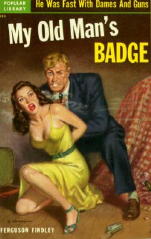
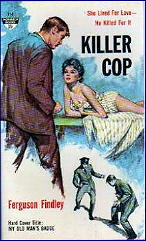
Waterfront. Duell, 1951 [Johnny Malone]. Serialized in Collier’s Magazine, August 1950. Popular Library #408, pb, 1952.
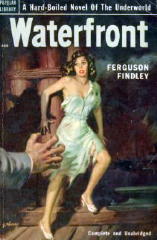
The Man in the Middle. Duell, 1952. Reprinted as Dead Ringer (Bestseller B160, 1953).
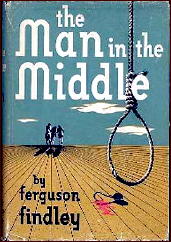
Counterfeit Corpse. Ace Double D-197, 1956.
Murder Makes Me Mad. Popular Library #780, 1956.
June 29th, 2009 at 6:19 am
Steve,
This sounds quite enjoyable!
I’ve never read anything by Ferguson Findley.
Years ago, saw the film version of WATERFRONT. This was THE MOB (1951). It had Broderick Crwford as this really tough cop who goes undercover on the docks. Crawford is believable as a working class stiff. Ernest Borgnine was a bad guy, and Neville Brand worked for him. These guys were all really roughnecks.
June 29th, 2009 at 8:29 am
The Mob was on TCM last year, and as Mike says a good little tough flick. Charles Bronson is in it too, and Richard Kiely. Crawford is the only witness to a mob hit, and goes undercover to find the killer and bring down the mob.
I’ll have to check out Findley — keeping Steve’s caveats in mind.